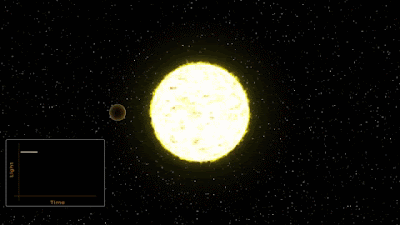 |
| T.E.S.S. final picture before being prepped for launch |
Launching from Cape Canaveral, it will add to the search for Earth-like exoplanets currently being scoped by Hubble and Keppler.
It will bridge the (ever-increasing) gap between now and the launch of the James Webb Space Telescope
I find it both commendable but also a good deal of why?
Exoplanets are already bountiful, but the hopes of ever reaching one are painfully slim.
I suppose it helps to identify chemical composition, and make comparisons with our own backwater world. In that respect, it may further our ability to i.d. various chemical signatures in the atmosphere of impossibly distant worlds.
Recently though, Proxima B, a strong exoworld contender, has apparently been subjected to a potentially lethal dose of radiation from its parent star.
 |
| Exoplanet transit |
Closer to home, we are finding tantalising possibilities of life in our own universe - the water plumes of Enceladus and the submerged oceans of Europa to name but two possible contenders; and now there is also the potential of microbes in the clouds of Venus.
The inhospitable surface of Venus has claimed many probes and led to the place being dubbed a hellish world, but the upper atmosphere has potential for further exporation - a floating ' cloud station' has even been mooted. There is also a pending joint America / Russia sortie ( the much delayed Venera -D)Still remaining in our vicinity - the Japanese explorer Hayabusa 2 is on schedule to collect and return with samples from asteroid Ryugu, having already found and imaged the target - if I'm not mistaken, this is the mission with hopping robots !
 |
| Minerva - hopping robot ISAS |
The return of Hayabusa 2 is scheduled for 2020, leaving Osiris- rex lagging behind (it won't get a visual of the target asteroid Bennu until August 2018, and return is scheduled for 2023 ) - but in the spirit of international co-operation, samples will be shared between the two missions.
Apropos of nothing, here is a link to a piece I was going to use as an illustration of spacetime travel, but I ran out of time...
G
It's not just birds that can ' see' the Earths magnetic field - ESA have Swarm on the case, too
The discovery of a galaxy lacking the elusive ' dark matter' has become a contentious issue...
